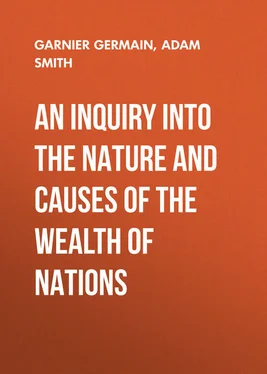Germain Garnier - An Inquiry Into the Nature and Causes of the Wealth of Nations
Здесь есть возможность читать онлайн «Germain Garnier - An Inquiry Into the Nature and Causes of the Wealth of Nations» — ознакомительный отрывок электронной книги совершенно бесплатно, а после прочтения отрывка купить полную версию. В некоторых случаях можно слушать аудио, скачать через торрент в формате fb2 и присутствует краткое содержание. Жанр: economics, foreign_antique, foreign_prose, foreign_business, на английском языке. Описание произведения, (предисловие) а так же отзывы посетителей доступны на портале библиотеки ЛибКат.
- Название:An Inquiry Into the Nature and Causes of the Wealth of Nations
- Автор:
- Жанр:
- Год:неизвестен
- ISBN:нет данных
- Рейтинг книги:5 / 5. Голосов: 1
-
Избранное:Добавить в избранное
- Отзывы:
-
Ваша оценка:
- 100
- 1
- 2
- 3
- 4
- 5
An Inquiry Into the Nature and Causes of the Wealth of Nations: краткое содержание, описание и аннотация
Предлагаем к чтению аннотацию, описание, краткое содержание или предисловие (зависит от того, что написал сам автор книги «An Inquiry Into the Nature and Causes of the Wealth of Nations»). Если вы не нашли необходимую информацию о книге — напишите в комментариях, мы постараемся отыскать её.
An Inquiry Into the Nature and Causes of the Wealth of Nations — читать онлайн ознакомительный отрывок
Ниже представлен текст книги, разбитый по страницам. Система сохранения места последней прочитанной страницы, позволяет с удобством читать онлайн бесплатно книгу «An Inquiry Into the Nature and Causes of the Wealth of Nations», без необходимости каждый раз заново искать на чём Вы остановились. Поставьте закладку, и сможете в любой момент перейти на страницу, на которой закончили чтение.
Интервал:
Закладка:
On the Inquiry into the Causes of the Wealth of Nations, it only remains farther to be observed, that its success has been every way commensurate to its merits. It has, however, been often regretted, that the author did not live to favour the world with his reasonings on those important events which have taken place since 1784, when he put the last hand to his invaluable work. That another, with competent talents, and a mind disposed to the task, should soon appear, to treat of these occurrences, and give a satisfactory view of the progress of the science from that time to the present, is not to be expected. But as the honour to be gained from a successful execution of such an undertaking is very considerable, it is not to be wondered at that an attempt of this kind should be made. Accordingly, Mr Playfair of London has had the boldness to follow Smith, by endeavouring to supply, in part, this desideratum, by adding supplementary chapters and notes to the Treatise on the Wealth of Nations.
But it is greatly to be feared, that there are few persons who have read this improved edition, as it is called, of Dr. Smith's Inquiry, but will still look forward to the accomplishment of the wishes they must previously have formed, for a continuation, and probably an illustration, of the discussions contained in that work. Leaving, therefore, the supplementary chapters and elucidations of Mr Playfair, it must be observed, that Dr. Smith has, on this occasion, been equally unfortunate in a biographer. The detail of his peaceful life is almost lost among dissertations on the wickedness of atheism and the horrors of a revolution. But these dissertations, strangely misplaced as they appear to be, would certainly not alone have been sufficient to attract observation here, whatever latitude the author might have allowed to himself on such subjects. When he goes on, however, to apologise for Dr. Smith's acquaintance with some individuals among the economists, and to connect the whole of that sect with those philosophers to whom he ascribes the evils which have so long afflicted France, his opinions become still more insupportable. It will, perhaps, be said, and with some reason, that, in this instance, at least, the writer has followed those alarmists, who, on any men of learning belonging to that country being mentioned, immediately ally them to the revolutionists without regard to difference of opinion, or distance of time.
The reputation, however, of the economists is too well established to be affected, either by the clamours of the ignorant, or the mad intemperance of political alarmists. The doctrine of the great men who formed the school of the economists, was, that the produce of the land is the sole or principal source of the revenue and wealth of every country; and this doctrine, with the manner of deriving from it the greatest possible advantage, it is almost universally acknowledged, engaged entirely their attention. Dr. Smith, who lived in great intimacy with many of the founders of that sect, does ample justice, on every occasion, to the purity of their views; and indeed they, as well as himself, it has always been said, by the impartial and well informed, were ever animated by a zeal for the best interests of society.
M. Quesnai, the first of that sect, and the author of the Economical Table, a work of the greatest profoundness and originality, was, in particular, represented by Mr. Smith as a man of the greatest modesty and simplicity; and his system he pronounced, with all its imperfections, to be the nearest approximation to the truth, of any that had then been published on the principles of political science. His veneration for this worthy man was even so great, that had he lived, it was his intention to have inscribed to him the Inquiry into the Causes of the Wealth of Nations.
Nor will the memory of those illustrious men be soon forgotten, notwithstanding the calumnies with which it has been charged. It may safely be predicted, in the words of a highly respectable periodical publication, that 'Those prospects of political improvements which flattered the benevolent anticipations of the economists, will soon be recognised as sound conclusions of science; and it will at length be acknowledged that Turgot, Mirabeau, and Quesnai, were the friends of mankind, and that their genius and their labours were devoted to the refinement of social happiness and the consolidation of the political fabric.' 3 3 Edinburgh Review, vol. i. p. 432.
The life of Mr. Smith, after the publication of his Inquiry, might be said to draw towards a close. The following particulars of the last years, are mostly extracted from Professor Stewart's Life of this incomparable writer.
After residing some time in London, he was appointed one of the commissioners of customs in Scotland, in 1778, when he removed to Edinburgh. He was accompanied by his mother, who, though in extreme old age, possessed a considerable share of good health; and his cousin, Miss Douglass, who had long resided with him at Glasgow, undertook to superintend his domestic economy.
The Duke of Buccleugh had continued to allow Mr. Smith L.300 a-year, and the accession which he now received to his income enabled him to live, not only with comfort and independence, but to indulge the benevolence of his heart, in making numerous private benefactions.
During the remaining period of his life, he appears to have done little more than to discharge, with peculiar exactness, the duties of his office, which, though they required no great exertion, were sufficient to divert his attention from his studies. He very early felt the infirmities of old age, but his health and strength were not greatly affected till he was left alone, by the death of his mother, in 1784, and of his cousin four years after. They had been the objects of his affection for more than sixty years; and in their society he had enjoyed, from his infancy, all that he ever knew of the endearments of a family. In return for the anxious and watchful solicitude of his mother during infancy, he had the singular good fortune of being able to show his gratitude to her during a very long life; and it was often observed, that the nearest avenue to his heart was through his mother.
He now gradually declined till the period of his death, which happened in 1790. His last illness, which arose from a chronic obstruction in the bowels, was lingering and painful; but he had every consolation to soothe it which he could desire, from the tenderest sympathy of his friends, and from the completest resignation of his own mind.
His friends had been in use to sup with him every Sunday. The last time he received them, which was a few days before his death, there was a pretty numerous meeting; but not being able to sit up as usual, he retired to bed before supper. On going away, he took leave of the company, by saying, 'I believe we must adjourn this meeting to some other place.'
In a letter addressed, in the year 1787, to the principal of the university of Glasgow, in consequence of his being elected rector of that learned body, a pleasing memorial remains of the satisfaction with which he always recollected that period of his literary career, which had been more peculiarly consecrated to his academical studies. On that occasion he writes: —
'No preferment could have given me so much real satisfaction. No man can owe greater obligations to a society than I do to the university of Glasgow. They educated me; they sent me to Oxford. Soon after my return to Scotland, they elected me one of their own members, and afterwards preferred me to another office, to which the abilities and virtues of the never-to-be-forgotten Dr. Hutcheson had given a superior degree of illustration. The period of thirteen years, which I spent as a member of that society, I remember as by far the most useful, and therefore, as by far the happiest and most honourable period of my life; and now, after three-and-twenty years absence, to be remembered in so very agreeable a manner by my old friends and protectors, gives me a heart-felt joy which I cannot easily express to you.'
Читать дальшеИнтервал:
Закладка:
Похожие книги на «An Inquiry Into the Nature and Causes of the Wealth of Nations»
Представляем Вашему вниманию похожие книги на «An Inquiry Into the Nature and Causes of the Wealth of Nations» списком для выбора. Мы отобрали схожую по названию и смыслу литературу в надежде предоставить читателям больше вариантов отыскать новые, интересные, ещё непрочитанные произведения.
Обсуждение, отзывы о книге «An Inquiry Into the Nature and Causes of the Wealth of Nations» и просто собственные мнения читателей. Оставьте ваши комментарии, напишите, что Вы думаете о произведении, его смысле или главных героях. Укажите что конкретно понравилось, а что нет, и почему Вы так считаете.












